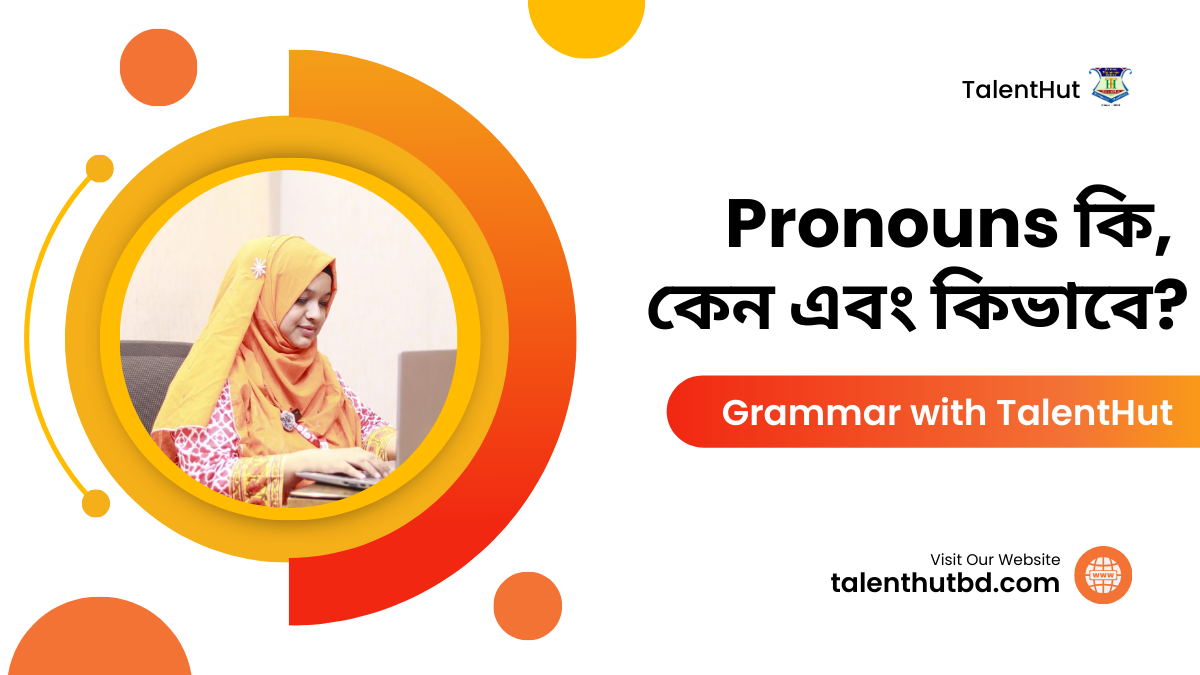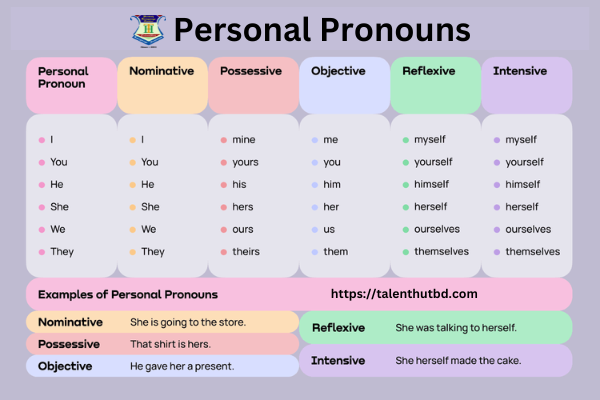Pronouns কি, কেন, কিভাবে ব্যবহার করবো?
Pronouns এর সকল বিস্তারিত
নিচের sentence গুলো খেয়াল করি, কোন pronouns কি দেখা যাচ্ছে?
- Rahim is a good boy.
- Rahim always completes Rahims homework.
- Rahim respects Rahim’s teacher.
- Rahim loves Rahims mother.
উপরের এই sentence গুলো দেখলে আমরা বুঝতে পারব যে বার বার Rahim কথাটা বারবার এসেছে।এরূপ ভাবে sentence লিখলে বা বললে সুন্দর শোনায় না।কিন্তু আমরা যদি এভাবে বলি –
- Rahim is a good boy
- He always completes his homework
- He respects his teacher.
- He loves his mother.
এতে করে sentence এর অর্থের ও কোনো পরিবর্তন হয়নি এবং sentence শুনতেও ভালো লাগে।
অতএব, আমরা বলতে পারি যে শব্দ বা শব্দগুচ্ছ কোনো noun এর পরিবর্তে ব্যবহৃত হয়ে ওই noun কেই indicate করে তাকে pronoun বলে
সাধারণ ভাবে আমরা বলতে পারি noun এর পরিবর্তে যা বসে তাই pronoun.
Pronoun ৮ প্রকারঃ
- Personal Pronoun : I,we,you,he,she,they,it etc.
- Demonstrative pronoun: this,that,these,those
- Interrogative Pronoun : who,what,which,whom etc
- Relative Pronoun: that,which,what,who,etc
- Indefinite Pronoun: any, anybody, anyone, anything, everybody, everyone, everything, nobody, none, no one, one, some, somebody, etc.
- Distributive Pronoun: each, either, neither
- Reflexive Pronoun: myself, yourself, yourselves, ourselves, himself, herself, itself, themselves etc
- Reciprocal Pronoun: each other, one another
বিভিন্ন pronouns এর তুলনামূলক চিত্র:
১। Personal Pronoun:
Subjective pronoun: I, we, you, you, they, he, she, it
Objective pronoun: me, us, you, you, them, him, her, it
Possessive pronoun: mine, ours, yours, yours, theirs, his, hers, its
Possessive adj: my, our, your, your, their, his, her
Subjective pronoun : Verb এর পূর্বে, preposition পূর্বে । Be verbs, as, than এর পর বসবে ।
I go to TalentHut.
I with my brother bargained with him.
It is I who am to blame.
He is as tall as I
She is better than I
Objective forms: Verb ও Preposition এর পর Objective form বসে।
Do you like the Novel?
Do you like it?
I call him/he likes her.
His father died in front of him.
Possessive pronoun: Verb এর পর এবং সাধারত বাক্যের শেষে ।
The house is mine. The bag is hers.
Possessive adjective: On এর পর এবং Noun এর পূর্বে বসে।
He insisted on my going.
That is my car.
নিম্নলিখিত ক্ষেত্রে it ব্যবহৃত হয়ঃ
১। জড় পদার্থ বুঝাতে –
I wrote a email and sent it to my father
২। ইতর শ্রেণির প্রাণী বা শিশুদের বুঝাতে –
I have a pet dog and its color is brown
I have two parrots and I love it very much
Child:
The child is crying for its mother
৩/ sentence এ কোন sub না থাকলে ব্যক্তি বা বস্তুকে না বুঝিয়ে impersonal verb এর sub হিসেবে ।
It is raining.
It was a hot hot summer.
8/ বাক্যে Force (জোর) দেবার জন্য যে ‘It’ ব্যবহৃত হয় তার নাম Emphatic ‘It’.
It is he who has done this.
More example:
দুরুত্ব বোঝাতে
it is long way.
It/to+v1=
Infinitive যদি কোন বাক্যের subject হয় তাহলে ঐ infinitive কে প্রথম এ ব্যবহার না করতে চাইলে বাক্যের প্রথম এ It ব্যবহার করতে হয়। যেমন:-
To swim is good exercise.
It is a good exercise to swim.
২। Demonstrative pronouns: এগুলো noun এর আগে বসে সেই noun কে নির্দিষ্ট করে।
এইগুলা, ওইগুলা, সেগুলা প্রায়ই কথা বলার সময় বলে থাকি=this,these,that,those
এগুলো সাধারণত adjective হিসেবে কাজ বেশি করে।
This is my home. These are sweet potatoes
That is your pen those are their pencils
৩। Interrogative pronouns: যে pronoun ব্যবহার করা করে কনো প্রশ্ন জিজ্ঞেস করা হয় তাকে interrogative pronouns বলে।
Who, whom, which, when, what, whose, where, when
What do you want?
Who(কে) are you?
Whom(কাকে/কাদেরকে) are you meet?
Whose(কার) is the pen?
What a fool I am!
Which is your bag?
When does he come?
Where have you gone?
৪। Relative Pronouns: বাক্যের ভিতরে কোন একটি noun সম্পর্কে নতুন তথ্য সংযুক্ত করার জন্য Relative pronouns ব্যবহার করা হয়।
Who, which, that, where, when, what, whom, whose, that.
-The boy who came here yesterday is my brother.(The boy= antecedent)who =R. P
-The girl is my classmate in TalentHutbd. she came here yesterday/The girl is my classmate who came here yesterday
-I saw a kite. It was flying in the sky. I saw a kite flying in the sky.
– I bought a clock that (যা) was expensive.
Uses of Relative Pronoun:
Who: শুধুমাত্র ব্যক্তিকে বুঝাতে
Whom: obj form এর পরিবর্তে – The lady (whom) I saw. /I saw (her)
Whose: possessive form এর পরিবর্তে- I saw a boy (whose) father was going to Dhaka/ His(the boy)father was going to Dhaka.
Which : বস্তু, ইতর প্রাণী ,শিশুদের পরিবর্তে।-the dress which he bought was red./he bought a red dress.
That: ব্যক্তি , বস্তু উভয়ের পরিবর্তে বসে-
This is the lady who lost his money.
This is the lady who lost his money
The little boy whom I helped was not poor.
৫। Distributive Pronouns: যে সকল Pronoun একজাতীয় একাধিক Noun- এর মধ্যে কোনো কিছুকে পৃথক করা বোঝায়, সেগুলোকে Distributive Pronouns বলা হয়।
Each of , either of , neither of = এদের পরে verb- singular হয় ।
Each of the boys is present today.
Either of the two boys is brilliant.
Neither of the girls is present today at TalentHut IELTS Center.
৬। Reciprocal Pronouns যে সব Pronoun দ্বারা দুই বা ততোধিক ব্যক্তির মধ্যে পারস্পরিক সম্পর্ক বোঝায়, তাদেরকে Reciprocal Pronouns বলা হয়।
Ex. One another. Each other.
The two students helped each other.
The 15 students help one another.
দুই জনের মধ্যে বুঝালে each other ; দুয়ের অধিক বুঝালে one another
৭। Indefinite Pronouns: যে Pronoun নির্দিষ্ট কোনো ব্যক্তি বা বস্তু কে না বুঝিয়ে অনির্দিষ্ট ব্যক্তি বা বস্তু কে বোঝায় সেসব Pronoun কে Indefinite Pronouns বলে।
যেমন– Any, one, some, , none ইত্যাদি।
Indefinite pronoun কোনো বাক্যের sub হলে verb সবসময় singular হয় ।
None can do this.
Everybody loves his/her mother.
One should do one duty
Something is better than nothing
Someone stole my phone
8. Reflexive pronouns: sentence এর subject এবং object যখন একই হয়, তখন subject কে উল্লেখ করার জন্য যেসব pronouns ব্যবহৃত হয়ে থাকে সেগুলোকেই reflexive pronouns বলা হয়।
এরা object কিংবা indirect object উভয় হিসেবে বাক্যে ব্যবহৃত হতে পারে।
যেমন: myself, ourselves, yourself, yourselves, himself, herself, itself, themselves etc
She cut herself when she was making dinner.
He killed himself(R.P)
The killed themselves
He prepared the dinner by himself.
The dog hurt itself.
উল্লেখ্য যে, Singular বোঝাতে শেষে self যুক্ত হয় এবং Plural বোঝাতে শেষে selves যুক্ত হয়।
Emphatic Pronoun: যে Reflexive Pronoun কোনে Subject-এর ঠিক পরে বসে তাকেই নির্দেশ করে এবং তার উপর জোর প্রদান করে তাকে Emphatic Pronoun বলে। যেমন-
I myself did it . (E.P)(আমি নিজেই এটি করেছিলাম।) এখানে ‘I’ Pronoun-এর ঠিক পরে myself বসেছে।
আবার, He himself went to school. (সে নিজেই স্কুলে গিয়েছে)
Myself did this (x)
I myself did this(correct).
He himself did the driving.
Rima herself spoke to the class.
Exercise for practice:
- Use of self/selves in the blanks.
Everyday I see ________in the mirror. They did not work_______ .He should think________
- Fill in the blanks with relative pronouns.
He ________wants to be healthy and takes regular exercise. This is the boy____ all like. he is honest _____is known to all. This is the baby ____was crying.
- Fill in the blanks with appropriate pronouns.
Rina and Raja love______. I have three close friends. _____study in Abroad. Tanisha is a good girl. _____know her well. This is my pen and that is_____. _____did you meet yesterday?
Antecedents: বলতে বুঝায় যে ব্যক্তি কথা বলছে সে নিজে নিজের কাজ করছে কিনা।
যেমন নিচের বাক্যে Tamanna and her শব্দ দ্বারা বুঝাচ্ছে tamanna তার সবচেয়ে পছন্দের lasagana তৈরি করছে।এটাই হচ্ছে মূলত antecedent.
Tamanna (antecedent) baked her famous lasagana for dinner.
She(antecedent) does her homework
She does his homework (No antecedent)
– Author:
Tamanna Akter
Faculty & Course Coordinator at TalentHut Gazipur Branch.
Email: [email protected]
Contact Office: +88(01611237732)
Grammar নিয়ে আমাদের ভিডিওঃ




